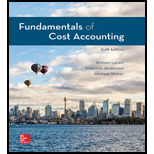
Fundamentals of Cost Accounting
6th Edition
ISBN: 9781260708783
Author: LANEN, William
Publisher: MCGRAW-HILL HIGHER EDUCATION
expand_more
expand_more
format_list_bulleted
Question
Chapter 12, Problem 27CADQ
To determine
Define the reasons behind setting the unrealistic profit target.
Expert Solution & Answer
Want to see the full answer?
Check out a sample textbook solution
Students have asked these similar questions
What would be the total production engineering cost per unit
I want the correct answer with accounting question
Accounting
Chapter 12 Solutions
Fundamentals of Cost Accounting
Ch. 12 - What does decentralization mean in the context of...Ch. 12 - Why is performance measurement an important...Ch. 12 - Prob. 3RQCh. 12 - What does dysfunctional decision making refer to?Ch. 12 - Prob. 5RQCh. 12 - What are the five basic kinds of decentralized...Ch. 12 - What is goal congruence? How is it different from...Ch. 12 - Prob. 8RQCh. 12 - What is relative performance evaluation?Ch. 12 - Prob. 10RQ
Ch. 12 - Prob. 11RQCh. 12 - Prob. 12RQCh. 12 - The management control system collects information...Ch. 12 - Salespeople are often paid a commission based on...Ch. 12 - Prob. 15CADQCh. 12 - Prob. 16CADQCh. 12 - On December 30, a manager determines that income...Ch. 12 - Prob. 18CADQCh. 12 - Prob. 19CADQCh. 12 - The manager of an operating department just...Ch. 12 - In the previous chapters, we considered different...Ch. 12 - A company has a bonus plan that states that...Ch. 12 - Prob. 23CADQCh. 12 - Prob. 24CADQCh. 12 - Prob. 25CADQCh. 12 - Prob. 26CADQCh. 12 - Prob. 27CADQCh. 12 - Prob. 28CADQCh. 12 - Prob. 29ECh. 12 - Evaluating Management Control SystemsEthical...Ch. 12 - Prob. 31ECh. 12 - Management Control Systems and Incentives A...Ch. 12 - Prob. 33ECh. 12 - Prob. 34ECh. 12 - Prob. 35ECh. 12 - Alternative Allocation Bases: Service Bartolo...Ch. 12 - Prob. 37ECh. 12 - Single versus Dual Rates: Ethical Considerations A...Ch. 12 - Single versus Dual Rates
Using the data for the...Ch. 12 - Alternative Allocation Bases Thompson Aeronautics...Ch. 12 - Tone at the Top, Ethics Once upon a time, a major...Ch. 12 - Prob. 42ECh. 12 - Prob. 43ECh. 12 - Internal Controls Commonly in many organizations,...Ch. 12 - Evaluating Management Control Systems SPG Company...Ch. 12 - Analyze Performance Report for Decentralized...Ch. 12 - Divisional Performance Measurement: Behavioral...Ch. 12 - Prob. 48PCh. 12 - Prob. 49PCh. 12 - Cost Allocations: Comparison of Dual and Single...Ch. 12 - Cost Allocation for Travel Reimbursement Your...Ch. 12 - Incentives, Illegal Activities, and Ethics An...
Knowledge Booster
Similar questions
- Brun Company produces its product through two processing departments: Mixing and Baking. Information for the Mixing department follows. Direct Materials Conversion Unit Percent Complete Percent Complete Beginning work in process inventory 7.500 Units started this period 104,500 Units completed and transferred out 100.000 Ending work in process inventory 12.000 100% 25% Beginning work in process inventory Direct materials Conversion $6.800 14.500 $21.300 Costs added this period Drect materials 116,400 Conversion Total costs to account for 1.067,000 1.183.400 $1.204.700 Required 1. Prepare the Mixing department's production cost report for November using the weighted average method Check (1) C$1.000 2. Prepare the November 30 journal entry to transfer the cost of completed units from Mixing to Bakingarrow_forwardNonearrow_forwardNot need ai solution please solve this general accounting questionarrow_forward
- What is the amount of current liabilities the firm has?arrow_forwardNeed answer of this question with financial accountingarrow_forwardThompson Aggrotech has a return on equity of 14.85 percent, a debt-equity ratio of 0.65, and a total asset turnover of 1.1. What is the return on assets?arrow_forward
arrow_back_ios
SEE MORE QUESTIONS
arrow_forward_ios
Recommended textbooks for you
- Principles of Accounting Volume 2AccountingISBN:9781947172609Author:OpenStaxPublisher:OpenStax College
 Auditing: A Risk Based-Approach (MindTap Course L...AccountingISBN:9781337619455Author:Karla M Johnstone, Audrey A. Gramling, Larry E. RittenbergPublisher:Cengage LearningBusiness/Professional Ethics Directors/Executives...AccountingISBN:9781337485913Author:BROOKSPublisher:Cengage
Auditing: A Risk Based-Approach (MindTap Course L...AccountingISBN:9781337619455Author:Karla M Johnstone, Audrey A. Gramling, Larry E. RittenbergPublisher:Cengage LearningBusiness/Professional Ethics Directors/Executives...AccountingISBN:9781337485913Author:BROOKSPublisher:Cengage  Financial Reporting, Financial Statement Analysis...FinanceISBN:9781285190907Author:James M. Wahlen, Stephen P. Baginski, Mark BradshawPublisher:Cengage Learning
Financial Reporting, Financial Statement Analysis...FinanceISBN:9781285190907Author:James M. Wahlen, Stephen P. Baginski, Mark BradshawPublisher:Cengage Learning Auditing: A Risk Based-Approach to Conducting a Q...AccountingISBN:9781305080577Author:Karla M Johnstone, Audrey A. Gramling, Larry E. RittenbergPublisher:South-Western College Pub
Auditing: A Risk Based-Approach to Conducting a Q...AccountingISBN:9781305080577Author:Karla M Johnstone, Audrey A. Gramling, Larry E. RittenbergPublisher:South-Western College Pub

Principles of Accounting Volume 2
Accounting
ISBN:9781947172609
Author:OpenStax
Publisher:OpenStax College

Auditing: A Risk Based-Approach (MindTap Course L...
Accounting
ISBN:9781337619455
Author:Karla M Johnstone, Audrey A. Gramling, Larry E. Rittenberg
Publisher:Cengage Learning

Business/Professional Ethics Directors/Executives...
Accounting
ISBN:9781337485913
Author:BROOKS
Publisher:Cengage


Financial Reporting, Financial Statement Analysis...
Finance
ISBN:9781285190907
Author:James M. Wahlen, Stephen P. Baginski, Mark Bradshaw
Publisher:Cengage Learning

Auditing: A Risk Based-Approach to Conducting a Q...
Accounting
ISBN:9781305080577
Author:Karla M Johnstone, Audrey A. Gramling, Larry E. Rittenberg
Publisher:South-Western College Pub